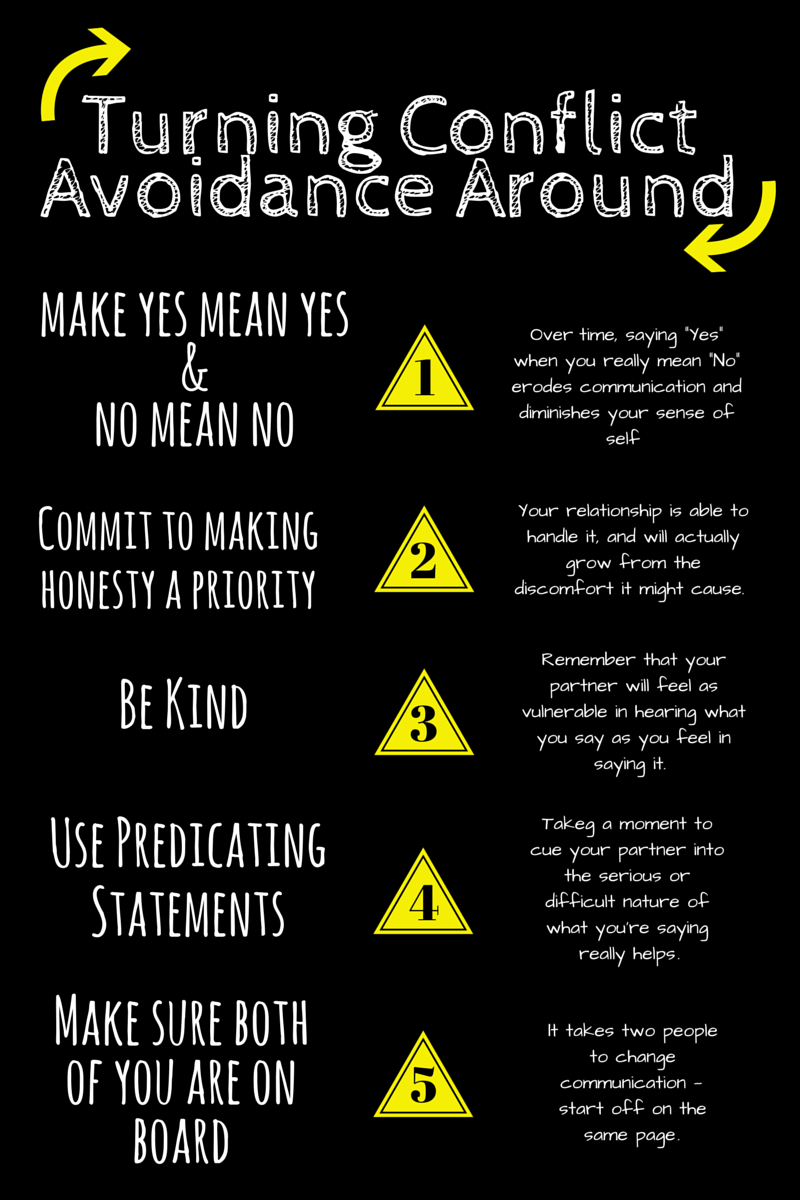The truth about conflict avoidance is that it is not honest. In order to avoid conflict a person must essentially lie. They say “Yes” when they really mean “No.” They say “No” when they really mean “Yes.” They leave something out of what they are saying because they know that to bring it up could reveal a potential disagreement. They tell a half-truth, or decide not to tell their partner anything at all about something that happened in their life.
 People engage in this sort of dishonesty all the time and often they do it for all the right reasons. Why upset their partner? Why ruin the night or the weekend? While the intention might be noble or sacrificial, the end result is that their partner is not getting accurate information. If the partner is assessing the flow of the evening or the general condition of the relationship on inaccurate information then the relationship gets entirely out of whack. One partner thinks they are enjoying a nice night out together while the other partner is tolerating a restaurant in the hopes of just getting through the evening.
People engage in this sort of dishonesty all the time and often they do it for all the right reasons. Why upset their partner? Why ruin the night or the weekend? While the intention might be noble or sacrificial, the end result is that their partner is not getting accurate information. If the partner is assessing the flow of the evening or the general condition of the relationship on inaccurate information then the relationship gets entirely out of whack. One partner thinks they are enjoying a nice night out together while the other partner is tolerating a restaurant in the hopes of just getting through the evening.
This kind of communication can really skew a couple’s emotional understanding and throw off the give and take balance that is the bedrock of healthy relationships.
 Avoiding conflict requires one partner to do a lot of guessing about how their partner is going to react in a situation — it may be an educated guess but it is still a guess. Even though a couple may have been together for a very long time and they may know each other very well, gauging how a partner is going to react relies upon assumption, perception, probability, even misperception. The only way to truly test such a guess is to bring it into the here-and-now by saying it out loud, addressing the potential disagreement, and then taking the conversation as it comes.
Avoiding conflict requires one partner to do a lot of guessing about how their partner is going to react in a situation — it may be an educated guess but it is still a guess. Even though a couple may have been together for a very long time and they may know each other very well, gauging how a partner is going to react relies upon assumption, perception, probability, even misperception. The only way to truly test such a guess is to bring it into the here-and-now by saying it out loud, addressing the potential disagreement, and then taking the conversation as it comes.
The problem with avoiding conflict is that much of what happens occurs behind the scenes. When conflict is being avoided, the relationship doesn’t know it exists, only one of the partners knows and it is effectively happening inside them. Over time there is a disconnection that begins to grow between partners. As partners lose their ability to communicate they lose their ability to connect and there is ultimately a loss of the give-and-take that makes a relationship thrive.
Couples will not have a thriving relationship if both partners do not take the risk to allow potential disagreements to arise in their conversations. If both partners commit to treating each other fairly and interacting with honesty and kindness, any couple can learn how to communicate more effectively and experience a relationship that thrives.
Developing a healthy conflict pattern in your relationship takes time, courage and patience.
If you and your partner implement these ideas you may be surprised at how quickly things begin to turn around. You will also find this type of change is self-sustaining – once the change begins couples usually likes it so much that together they commit to this new way. Here are some practical tips to help you and your partner develop a more healthy communication pattern:
- Make sure that your “Yes” means “Yes” and your “No” means “No.” Overtime, saying “Yes” when you really mean “No” erodes communication and diminishes your sense of self – it will cause your relationship to get out of whack. Though it can sometimes take courage, it’s essential to be honest with each other about your preferences. Otherwise neither partner can truly know where things stand in the relationship.
- Commit to making honesty a priority – even in the small things. Prioritizing honesty, even above what you think your partner’s reaction is going to be, is crucial to healthy communication. Be honest, say what is on your mind. You may be worried about your partner’s reaction but trust the process. If you take the time and the necessary care to talk it through you will see that your relationship is able to handle it and will actually grow from any discomfort that your honesty might cause.
- Be kind. Making the shift from conflict-avoidance to honesty in your discussions does not mean being “brutally honest.” Why would anyone ever be brutal with their partner? Remember that your partner will feel as vulnerable in hearing what you have to say as you feel saying it. Remember to be delicate, be courteous and kind in your interactions.
- Use predicating statements. You will be surprised how effective it can be to use simple statements before a difficult message is delivered. “Please don’t take this the wrong way,” or “This isn’t easy for me to say,” or “I’m not angry, I just need to talk about this.” etc. Taking a moment to cue-in your partner about the seriousness or difficult nature of what they are about to hear can go a long way to easing defensiveness in your discussions.
- Make sure you are both on board. Often times during couples therapy, when I’m coaching a couple on more effective communication, they will say: “We’ve already tried that.” Of course I understand that they have probably tried numerous things, multiple times, and found them to be mildly effective or not effective at all. I always tell them that one of the main differences this time is that they will be on the same page – doing this together.
Communicating honestly is a vulnerable process. It can take courage and practice. If it were easy, most couples would do it naturally. The only way that the insights in this article and these five tips will help your relationship is if both of you commit to trying to understand and implement the ideas together.
